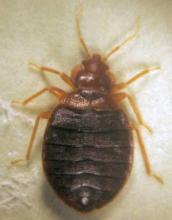Bed Bugs
What are Bed Bugs

The bed bug (Cimex lectularius) is a wingless, red-brown insect that feeds on blood. It is small (about the size of an apple seed) and you can see them without a magnifying glass. Bed bugs are not considered a public health risk because they are not known to spread diseases. They can, however, cause skin irritations and sleepless nights.
Bed bugs usually live from four months to a year. They hide in cracks and crevices in beds, wooden furniture, floors, and walls during the daytime. At night, they emerge from hiding and feed on their preferred host: humans.
In 2005, the Health Department began receiving complaint about bed bugs in the city. In response, we have developed several presentations and brochures to assist residents and businesses in the city.
Prevention
At Home
- Vacuum carpets and along baseboards regularly. Throw vacuum bag away outdoors as soon as you are done vacuuming.
- Do not pick up used furniture that someone has put out for trash. The better the item looks, the more likely it is infested with bed bugs. Leave it by the curb!
- Protect your mattress and box springs with bed bug proof mattress covers.
- Reduce clutter in your home to reduce places where bed bugs can hide.
- Be careful when buying used items. Inspect them for bed bugs before bringing them into the house.
While Traveling
- Use a soft bag or duffel that can be put in the washer and dryer.
- After checking in, inspect the mattress, headboard, behind hanging pictures or loose wallpaper, along the baseboards, and on the fabric straps of the luggage rack. Look for dark spots, eggs, and molted skins.
- Keep your luggage on the luggage rack (inspect carefully, especially under the fabric straps), not on the carpet or bed. Luggage may also be kept on a table away from the bed or in the bathroom.
- Don't put clothes in the dresser drawers.
- Vacuum suitcases and put all clothes (clean and dirty) into the dryer immediately upon return.
From House Guests
- Encase guest room mattresses and box springs with bed bug proof mattress covers.
- Remove as much clutter as possible from the room.
- If possible, discreetly inspect luggage and clothes while unpacking.
- Keep luggage away from the bed and off the floor. You may consider having the guest store their belongings in a plastic storage bin with the lid on.
- After the guest leaves, inspect the room and vacuum thoroughly, especially along baseboards, and inspect the mattress, headboard, drawers, and the place where luggage was stored.
What To Do if You Have Bed Bugs - Alexandria, VA
Getting rid of bed bugs is difficult and time consuming, but it can be done. Residents and landlord or property management must work together to succeed. There is no single tool or activity that, used alone, will eliminate bed bugs, including pesticides. Multiple techniques are always required because bed bugs are small, good at hiding, and can live without feeding for many months. Treatment of a living area for bed bugs should focus on containment of the infestation. Do everything possible to avoid spreading bed bugs to new locations. A combination of the following steps will be needed for bed bug control:
- Clean and organize the bed, bedroom, other living areas, furniture and belongings, including elimination of clutter
- Physical removal of bed bugs and eggs using a vacuum (dispose of the vacuum bag immediately, bugs can survive and crawl back out of the bag)
- Barriers, such as mattress encasements and sticky barriers (sticky traps may be useful for monitoring but will not help control bed bugs)
- Steam or cold treatments (to kill all life stages)
- Eliminate bed bug hiding spots
o Fix peeling wallpaper and paint
o Caulk or seal cracks and crevices around the room and on furniture
o Seal floors or the spaces between floor boards or tiles
o Make other repairs to the living area to reduce hiding spots - Chemical applications
o Low risk pesticides
o Professional use pesticides
o Professional fumigation
Hiring a Pest Management Professional
- The pest management company should be licensed by the state and insured.
- The company should be a member of a professional organization, such as the National Pest Management Association.
- The company should have a staff entomologist or access to one.
- Technicians should have experience with bed bug management.
- Choose a company based on their quality of service, not the price. Get several proposals for service if possible and compare them.
- A pre-inspection should be conducted to assess the scope of the work.
- The proposed work should follow the steps of integrated pest management, not just pesticide application.
- Technicians should be straightforward and open when discussing details of their service.
- Understand what guarantees are being offered. Bed bug management may be difficult to guarantee, because re-infestation from an outside source is possible.
Brochures & Resources
- Don't Let the Bed Bugs Bite! (.pdf) -- (en español )
- Control of Bed Bugs in Hotel Rooms (.pdf)
- Bed bug fact sheets and presentations from the Virginia Department of Agriculture and Consumer Services www.vdacs.virginia.gov/pesticides/bedbugs-facts.shtml
- For more information on the Biology and Control of Bed Bugs click to view a Bed Bug presentation.
- Need help? Call the Alexandria Health Department at 703.736.4910. Translation services are available.
- If your bed bugs are affecting your breathing, check out ALX Breathes